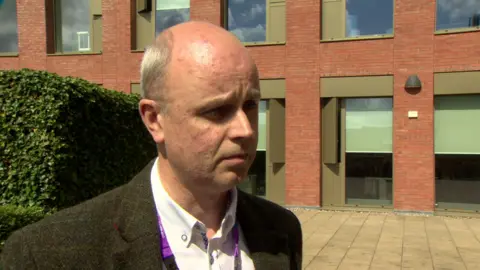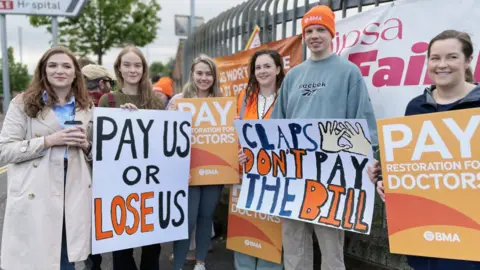Aileen Moynagh,BBC News NI health reporter
 BBC
BBCJunior doctors across Northern Ireland are taking further strike action over the next two days in a dispute over pay.
The 48-hour full walkout runs from 07:00 BST on Thursday 6 June until 07:00 on Saturday 8 June.
The Department of Health (DoH) said patients are advised to expect “widespread disruption” to normal services.
The move will coincide with the launch of a new IT system in the Belfast Trust on Thursday, but the trust anticipates “minimal problems” on that day.

The trust said it considered changing the launch date, but as hundreds of appointments had been rescheduled on 6 and 7 June because of industrial action, there is less pressure on the new system for the roll-out.
It said mitigations will be in place to support staff “to deliver safe and effective care over the strike period and into the weekend”.
When the ballot for this industrial action was launched, junior doctors, like the rest of Northern Ireland’s health service staff, had received no pay award for 2023/24.
However, the DoH said a backdated 2023/24 pay award for junior doctors will be paid this month, “with its terms in line with the recommendations of the national pay review body, the DDRB”.
This pay award involves an average pay increase of 9.07% for junior doctors in Northern Ireland, with those in their first year receiving a 10.68% uplift.
The current base starting salary for a junior doctor is about £26,000.
However, this does not take into account weekend or out-of-hours work.
‘I don’t want to leave’
Dr Edwina Hegarty is a trainee doctor in infectious diseases at the Royal Victoria Hospital in Belfast. She and her husband are taking an opportunity for further training in Newscastle in England, but said she “would be lying if I said we weren’t actively looking our get-out plan.”
She told BBC Radio Ulster’s Good Morning Ulster programme that she has seen a “year-on-year deterioration in the conditions that doctors are working in”, and with that “seen deterioration in the conditions that patients are having to suffer”.
“I don’t want to leave, I have excellent family, friends, colleagues. I want to stay but given what we have seen with the lack of willingness to negotiate on this full pay restoration issue with the department of health it’s looking increasingly difficult,” Dr Hegarty said.
She added that junior doctors received a letter from the incoming health minister Mike Nesbitt on Wednesday offering a meeting with all branches of practice, but no offer of negotiation.
What is a junior doctor?
Junior doctors are qualified doctors who are still involved in clinical training, according to the British Medical Association (BMA).
Patients may be treated by a junior doctor in a hospital or general practice setting.
All have completed a medical degree and can have up to nine years’ of working experience as a hospital doctor or up to five years working and gaining experience to become a GP.
They work under the supervision of a senior doctor.
 PA Media
PA MediaWhat services are affected?
Belfast Trust
468 outpatient appointments cancelled
Six inpatient/day case procedures cancelled
Southern Trust
152 outpatient appointments postponed
28 day cases postponed
South Eastern Trust – postponed services
258 outpatient appointments
311 radiology appointments
42 endoscopy procedures
34 day case procedures
772 outpatient appointments going ahead
Western Trust and Northern Trust – no details as yet
New patient record system
Dr Johnny Cash from the Belfast Trust said he recognised and acknowledged junior doctors’ entitlement to strike but felt going live with the new patient record system on 6 June was “definitely the safest thing” for patients.
When asked if a downturn in services due to industrial action helped with encompass going live, Dr Cash said that was “certainly one way of looking at things”.
Long term, it is hoped the new system will have a positive impact on waiting lists, but Dr Cash said it was “unfortunately inevitable” that there would be a “negative impact on waiting times while we roll this programme”.
He said it has an “ambitious plan to return to normal activity, hopefully by mid-summer”.
The South Eastern Health and Social Care Trust was the first trust to have its records digitised in Northern Ireland.
Delayed appointments
Dr Cash said the South Eastern Trust had “plenty to learn and plenty to teach us about going live” and that changes had been made to the initial system.
In March, BBC News NI reported that appointments in the South Eastern Trust had been delayed due to the new patient record system.
Since its launch in November 2023, it has conducted a survey to explore the staff experience of the system.
It shows the average reported confidence level of respondents in using encompass is averaging five out of 10, a slight improvement over three months.
However, frustrations still exist around more training and support required, system functionality and navigation issues also reporting governance and safety concerns.
Dr Cash said this was not a concern, adding that while it would be “difficult for our staff”, plans were there to support them.
Last week, BBC News reported that problems with NHS computer systems in England were linked to patient harm, but Dr Cash said he wanted to “reassure” the public that it was “a different system” and not related to the encompass programme which was being rolled out in Northern Ireland.
The encompass system has been built by a company called Epic which currently provides electronic records for more than 300m people within the UK and across the globe.





